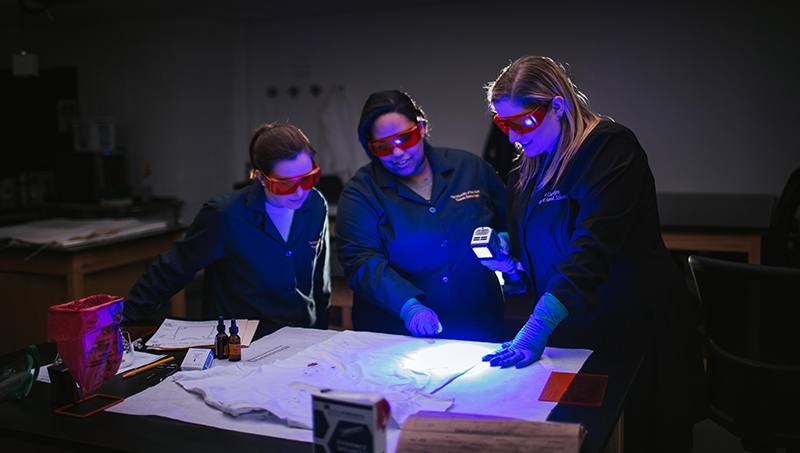The Next Generation of Forensic Investigations
The fully online Graduate Certificate in Forensic Investigative Genetic Genealogy (FIGG) is the first program of its kind in the world. It provides individuals from the public and private sectors with a depth and breadth of knowledge and training in the core competencies necessary to effectively carry out Forensic Investigative Genetic Genealogy investigations. This comprehensive program provides a unique opportunity to broaden your education and develop key knowledge and skills in this specialized field.
The program begins with the most up-to-date primer on the fundamentals of forensic biological evidence and the current forensic DNA profiling workflow that is practiced in forensic investigations, prior to the use of Forensic Investigative Genetic Genealogy. Following this, the program explores advanced DNA testing methods for genetic genealogy purposes with the goal of harvesting probative information from biological evidence to infer genetic relatedness between individuals. The curriculum will focus on the use of the many tools available to make connections between genetic matches/relatives that are identified in the public genetic genealogy databases approved for use by law enforcement. Next, you will gain significant knowledge in genealogical research using documentary evidence and the building of family trees, with a strong focus on adhering to the Genealogical Standards. You will learn how to critically evaluate and correlate accurate records to reach credible conclusions about identities and relationships using reliable sources. The program culminates in a practical experience where you will put your newly gained knowledge and skills to the test through investigating a mock forensic investigative genetic genealogy case, with the goal of demonstrating your professional competency in the use of this novel investigative tool. This comprehensive educational program will provide you with the knowledge and skills to efficiently and, importantly, accurately use this novel investigative tool in both forensic/criminal investigations and family history research.
Key Features:
- Format: 100% online
- Course delivery: Asynchronous (i.e., no live class times/lectures)
- Time to complete program: 2 full academic semesters (Fall and Spring), split into two mini-terms per full semester
- Term Schedule: One course per mini-term, taken in sequence
- Cohort program: Students begin the program in the Fall semester and complete the program at the end of the Spring semester
- New program cohort begins every Fall
- Four 3-credit courses required (12 credits total)
- Tuition is charged at the graduate per-credit rate. Click here for current tuition information
- 30% tuition discount for current members of the Law Enforcement/Forensic Science community
Application Information for the 2025/2026 cohort of program:
- Priority Application Deadline: June 2, 2025
- Priority Application Review: June 2-6, 2025
- Priority Admissions Decisions Letters Released: June 9, 2025
- Enrollment Deposit Deadline: July 1, 2025
- Waitlisted Application Review: July-August 2025
| Course |
Term Delivery |
Credits |
| FORS 6600 Fundamentals of Forensic Biological Evidence* |
Fall I mini-term; 7 weeks |
3 |
| FORS 6601 Genetic Genealogy Principles and Methods |
Fall II mini-term; 7 weeks |
3 |
| FORS 6602 Genealogical Principles and Methods |
Spring I mini-term; 7 weeks |
3 |
| FORS 6603 FIGG Practicum |
Spring II mini-term; 7 weeks |
3 |
| Total Credits |
|
12 |
*For students who are experienced forensic practitioners and therefore do not need the content delivered in the first course (FORS 6600), this course can be substituted with FORS 6604 Forensic DNA Phenotyping: Appearance and Ancestry, or a crediting exam, both delivered in Fall I miniterm.
